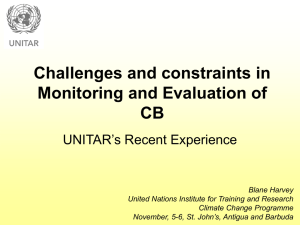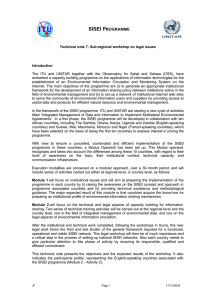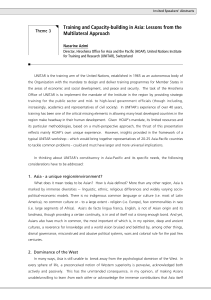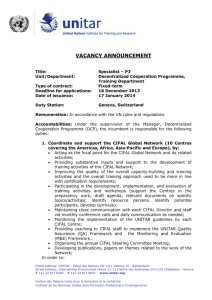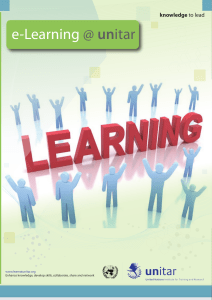THE SISEI PROGRAM PROJECT REPORT ON IMPLEMENTATION OF THE ACTIVITIES
advertisement
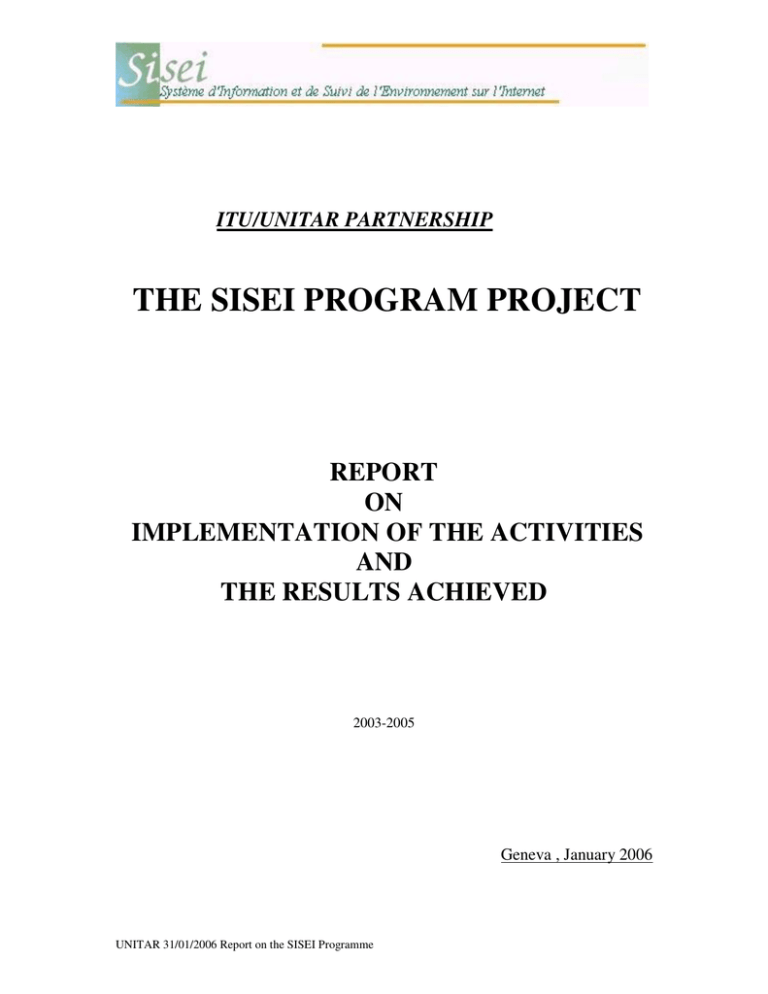
ITU/UNITAR PARTNERSHIP THE SISEI PROGRAM PROJECT REPORT ON IMPLEMENTATION OF THE ACTIVITIES AND THE RESULTS ACHIEVED 2003-2005 Geneva , January 2006 UNITAR 31/01/2006 Report on the SISEI Programme Table of contents Page 1. 2. 2.1 2.2 2.3 Introduction The SISEI programme Concept and approach Programme objectives and expected results Methodology and tools 3. 3.1 3 3 3 4 5 The implementation of the programme First phase: Introductory Workshops to foster the institutional preconditions for effective information management 3.1.1 Activitie’s implémentation 3.1.2 Output and results 5 6 6 7 3.2 Second phase: Training workshops to enhance technical capacities 3.2.1 Implementation activities 3.2.2 Output and results 8 8 9 3.3 Third phase: Workshops to discuss legal issues of environmental information sharing 9 3.3.1 Implementation activities 9 3.3.2 Outputs and results 11 4. Results and lessons learned 11 5. Conclusion and perspectives 12 6. Recommendations for future program implementation 15 7. 6.1 6.2 Annex Technical notes Workshop reports UNITAR 31/01/2006 Report on the SISEI Programme 15 15 2 1. INTRODUCTION The improved management of the world’s wealth of information by using new information and communication technologies (ICTs) has become a critical precondition for effective natural resource management and sustainable development all over the world. In the past decades considerable progress has been made in data collection, harnessing and analysis due to the improvement of used information technology, in particular in developed countries. While considerable data already exist, more and different types of data need to be collected, at the local, provincial, national and international levels, indicating the status and trends of the planet’s ecosystem, natural resource, pollution and socio-economic variables. The gap in the availability, quality, coherence, standardization and accessibility of data between the industrialized and the developing world has been increasing, seriously impairing the capacities of the countries to make informed decisions concerning environment and development. Against this background strengthening the collection and the exchange of environmental information is recommended by several international agreements. In chapter 40 of the Agenda 21 and other environmental conventions attention is given to the importance of environmental monitoring, data collection, analysis and exchange and the necessity of related capacity building. To enhance the efforts undertaken by countries to implement international environmental agreements it was necessary to develop effective approaches to improve the access to and the dissemination of environmental information for an enlightened decisionmaking in sustainable development, in particular in African countries. This can be achieved not only by the transfer and use of new information and communication technologies, but also through a more effective coordination among different activities and players. Based on the experiences of former Environmental Information Systems (EIS ) initiatives in Africa and the perception that they have been seriously impaired by their limitation to purely technical aspects, a successful approach to establish sustainable environmental information networks has to take into consideration also non-technical aspects, in particular the institutional and legal aspects which appear to be of fundamental and critical importance . 2. THE SISEI PROGRAM 2.1 Concept and approach There was a need for a comprehensive capacity building approach to increase the sustainability of EIS initiatives and to guarantee effective application of environmental information management tools in order to assist in the implementation of multilateral environmental agreements in Africa based on new information and communication technologies. Such an innovative approach is based on the appropriation and use of new technological tools to rapidly close the existing gaps in the institutional and legal framework which today are impeding the efficient environmental information management and sharing. UNITAR 31/01/2006 Report on the SISEI Programme 3 Namely this approach calls for: -Firstly, the establishment of an efficient institutional framework for a dynamic participative partnership between information suppliers and end-users. The institutional component fosters coordination, synergy and synchronization between different national governmental institutions and other non-governmental stakeholders through consultation and decision-making on a basis of negotiated consensus. - Secondly, the appropriation of technological tools aiming at mastering the new information and communication technologies to make environmental information processing , harnessing and sharing more efficient. This requires to focus on strengthening capacities for communication techniques and developing the national telecommunications infrastructure in view to ensure and facilitate circulation and access to and efficient use of information and to make the newest communication technologies accessible to all at national level. Human and technological capacities of institutions have to be developed to ensure full and most economical use of existing national infrastructures for the compilation and circulation of the information, relying in particular on use of open source softwares, and to promote the knowhow on information and communication techniques, for a most efficient management and circulation of environmental information. - Thirdly , the development of an appropriate legal framework which guarantees and encourages the easy access to and the active dissemination of environmental information, in line with Principle 10 of the Rio Declaration, and promotes the integration of scientific and technical data in planning and decision-making processes. 2.2 Program objectives and expected results The “Système de Circulation de l’Information et de Suivi de l’Environnement sur Internet” (SISEI programme) reflects this approach and accordingly was developed to generate adequate conditions for the establishment of a coherent and efficient institutional and legal framework as well as the development of an operational technological tool for an easier access to environmental information. This is achieved through the strengthening national capacities to use information and communication technologies (ICT) applications, the development of data sharing mechanisms and the establishment of an operational network of institutions and other stakeholders using and /or producing information. Such a SISEI network is set-up as a decentralised computerised system of harmonised web sites connected by electronic means, to facilitate standard access of data, information and products relating to the environment and to promote enhanced: - Capacity for improved management of existing data bases and other information sources; - Utilisation and repackaging internet-sourced information to support policy-oriented action at various levels; - Capacity for integrating environmental data and information into development planning processes at national and district levels in the context of sustainable development; - Collaboration and coordination between the national institutions as well as other stakeholders at various levels. UNITAR 31/01/2006 Report on the SISEI Programme 4 This information sharing network will enable a range of users to access optimised information that can be used to improve natural resource management and establish interactive contact with different partners at various levels in order to prepare national reports and presentations for the conferences of parties of international conventions on environment and development and to assist in the related implementation processes. Among the users and stakeholders of such an information sharing network are the public authorities Decision-Makers and Officials, such as the national coordination bodies, the ministries ,the government agencies , the experts and consultants in Universities and training and research institutes, the members of the civil society (NGOs), the national specialised chambers and associations, the media and the national private sector as well as the programme and project managers from international and/or regional organisations and bi- and multilateral development agencies established in the country , etc.. 2.3 Methodology and tools To apply this concept , a methodology was developed based on strengthening national and sub-regional capacities mostly through institutional facilitation with a participatory approach for consensus building , training the trainers for technical as well as legal capacity building, promotion of south-south coordination and cooperation. Specific tools were designed and made available to assist in describing and analysing existing institutional frameworks and coordination mechanisms in the field of environmental management, in assessing the present performance and setting, on a mutually agreed basis, future targets for environmental information management and sharing. Four major phases have been identified to implement the described concept: - Phase for institutional preparation, - Phase to determine the network equipment requirement and organise technical training - Phase to raise awareness on the importance of the legal aspects for the information sharing. - Phase to evaluate the programme will be addressed later). 3. THE SISEI PROGRAM IMPLEMENTATION To implement the program training and restitution workshops were held at regional and subregional .Invitation letters were sent to the responsible authorities of the participating countries, outlining the objectives of the workshops. An attached technical note gave detailed information on the workshop agenda, the expected results and the administrative and financial arrangements for the countries participants. The selection of the suitable participants from each country was the prerogative of the respective responsible national authority. ITU and UNITAR collaborated in the preparation of the workshops (flights, hotel booking, fellowships etc.) and on the site UNITAR together with the local host institution /organisation took responsibility for the organisation and conduct of the workshops. UNITAR 31/01/2006 Report on the SISEI Programme 5 3.1 First phase: Introductory workshops to foster the appropriate institutional framework for effective information management Effective coordination and operational communication channels to ensure information flow is a necessary prerequisite to efficient information sharing and to incorporating information into decision-making processes. However, in most of the African countries there is often a lack of efficient coordination and cooperation between institutions as well as other stakeholders. This causes difficulties in access to information and leads to lack of transparency of the national activities affecting environmental related issues. Hence, the institutional context for environmental management has to establish and promote a partnership that is accepted by all concerned national players and that gives an adequate and equitable involvement to every one of them. The institutional phase aims therefore at raising awareness on the necessity for a coordination and cooperation at the national level. A forum of discussion to which all the interested players are parties , will identify interests and commitments of all and each , in a flexible and interactive participative process that includes regular consultations and training workshops at country level . To facilitate this institutional phase conduct the following tools have been developed: - A Self-Assessment Exercise on Environmental Information Management and Sharing: To facilitate the elaboration of the Institutional Profile it is recommended to conduct a self-assessment on environmental information management and sharing to assess capacities and needs and to determine objectives as well as priorities in all partner institutions and organisations. - An Institutional Profile of Environmental Information Sharing Mechanisms: The purpose of such an Institutional Profile is to present the environmental framework with regard to the legislation, mechanisms of coordination, data, expertise and facilities and the way they are shared among stakeholders at the country level. - An Information Charter: The Information Charter is a policy document on information sharing mechanisms elaborated and agreed upon by consensus by the national institutions involved in environmental and natural resource management and for which the SISEI information network is set up . The Charter exposes the objectives, roles and responsibilities to be assigned to partner institutions. Its purpose is then to provide a framework that contributes to maximizing available information, facilitating discussion and consultations among partner institutions that share the same or converging concerns. 3.1.1 Implementation activities Two introductory sub regional workshops on the SISEI programme were held 1n year 2003 The first, organised for the French-speaking countries associated in the programme, took place in Bamako, Mali, from the 8th to the 12th of September 2003, and have seen the participation of 25 representatives from Guinea, Mali, Mauritania, Morocco and Niger. UNITAR 31/01/2006 Report on the SISEI Programme 6 The second workshop, organised for the English-speaking countries, was held in Accra, Ghana, from the 22nd to the 26th of September 2003 with the participation of 20 representatives from The Gambia, Ghana, Kenya, Uganda and Zambia. Objectives: The main objectives of these introductory workshops were: - to introduce the SISEI concept, components and tools to the participating countries to have the participating countries present their national activities and achievement in the field of environmental information management. to share respective experiences in order to assess and/or refine country needs regarding capacity building in relation to environmental information management to develop with the recipient countries a planning and schedule of activities in order to launch the SISEI programme in each country. Proceedings: For each associated country three representatives, two from the environmental sector and one from the telecommunication sector, attended the workshops. The countries’ representatives gave an overview over the current situation of environmental management, the telecommunication sector and environmental information management in their respective countries. These countries presentations were followed by a global introduction by UNITAR to the concept of the SISEI programme with a focus on the institutional aspects. Then the participants discussed in working groups the different aspects of the institutional and legal framework of environmental information sharing. UNITAR gave afterwards an overview on the implementation steps and the organisation of a national workshop to launch the SISEI programme at the country level. This guided the participants in the elaboration of their respective Introductory Institutional SISEI Workshop. Finally the participants adopted the workshop recommendations before the workshop was officially closed (for more details on the proceedings see the workshop report in the Annex). Activities at the national level: To launch the SISEI programme at the national level , each associated country organised its national introductory workshops to which were invited potential national partners of the national SISEI network , ie the governmental institutions, the NGOs and the private sector companies active in the field of environmental protection and producing or using environmental information. These national introductory workshops helped to raise awareness among the representatives of the different participating institutions and organisations on the use and benefit of the SISEI programme and to formulate a country action plan for its implementation, taking into account the specific context in each of the associated countries. 3.1.2 Output and results During this institutional phase the national stakeholders: - Each country prepared a draft National Information Charter, - Most of the countries initiated the elaboration of their National Institutional Profile of Environmental Information Sharing Mechanisms . - All countries have set up a Steering Committee UNITAR 31/01/2006 Report on the SISEI Programme 7 3.2 Second phase: Training workshops to enhance technical capacities In order to enhance the level of know how and capabilities of the associated counties a Trainthe-Trainers workshops on information management systems, including software and application tools, was provided at the sub-regional level. During these workshops , in addition to knowledge and know how acquisition , the participants built their national Web Portal as a specific tool to serve as the environmental gateway offering the national users as well as regional and international ones , an information shop with several functionalities. This Web Portal comprises “country spaces” with specialised gateways, encompassing different types of information: - An “Institutional Kiosk” that gives an overview over the institutional framework in the field of environmental management at country level. It is composed of various categories of players such as coordination bodies, ministries, local communities, NGOs, business companies, research institutes, media etc. and provides access to the Web sites of these environmental institutions and organisations. - A “Thematic Kiosk” that offers information on the country’s activities in different environmental sectors, e.g. forestry, desertification, biodiversity. - An “Information and Data Kiosk” that offers the possibility to retrieve specific application environmental information and data, like virtual libraries, maps, etc. 3.2.1 Implementation activities To implement this second programme phase two sub regional training workshops on technical aspects of the SISEI programme were held. The first one for the French-speaking countries took place in Tunis, Tunisia, from the 14th to the 18th of June 2004 and the second one for English-speaking countries was held in Accra, Ghana, from the 28th of June to the 2nd of July 2004. In the Tunis workshop 12 participants from six countries (Guinea, Mali; Mauritania Morocco, Niger + Tunisia, as the host country) participated. In the Accra workshop 10 participants from three countries (Ghana, Uganda and The Gambia) took part Objectives: The major aim of these technical workshops was to train two experts from each associated country (Ghana had 6 as the host country) on information management systems that will guarantee the technical operational running of the SISEI network. The trained experts were requested to serve as trainers in their respective countries, in order to convey the gained knowledge to their counterparts in other SISEI partner institutions. Proceedings: To facilitate the selection of the participants a technical note was prepared by UNITAR, which describes the required profile for the training workshop’s participants. This helped to guarantee that the participants had the basic needed expertise and experience to benefit fully from the training sessions, which include software and application tools. UNITAR representative presented and illustrated the technical configuration of the web site and gave detailed explanations on the SPIP software and how to use it. The user’s and administrator’s role were defined and the structure of the functioning of the SISEI web was detailed and illustrated through the conduct of practical and real time exercises involving existing SISEI network .The workshops adopted the recommendations on follow-up activities at the country level. UNITAR 31/01/2006 Report on the SISEI Programme 8 Activities at the national level: Following these sub-regional workshops the participants were requested to organise training sessions for their national counterparts in order to transfer to the maximum number of partners in their respective country the knowledge and expertise acquired and to distribute the questionnaire on the country technical communication infrastructure and equipment to prepare the technical capacity building for SISEI partner institutions. 3.2.2 Outputs and results - The participating countries committed to conduct technical trainings for the SISEI partner institutions at the national level as well as to fill in questionnaires on technical capacities application of the SPIP and the SISEI web site. - All countries created their National Portals on the SISEI web site. 3.3 Third phase: Workshops to discuss legal issues of environmental information sharing In most African countries an appropriate legal framework to support environmental information management and sharing, as requested in several international environmental conventions is still missing. Hence, it was necessary to raise the awareness on international and regional environmental agreements and its articles on information management and sharing. Further there was the need to identify key constitutional, statutory provisions and other legal texts, which regulate environmental management and the access to and the dissemination of information by public institutions in partner countries, as well as gaps in their national legislation. In this context special attention has to be given to secrecy legislation in force and the dispositions concerning confidentiality and copy-rights. Apart from the institutional responsibilities linked to environmental information collection and dissemination, the availability and accessibility of environmental data held by public institutions and private parties as well as their specific obligations to make them accessible have to be clarified. 3.2.1 Implementation activities Two sub-regional workshops on the legal aspects of the SISEI programme were held. One for French-speaking countries in Nouakchott, Mali, from the 28th of November to the 3rd of December 2004, gathered 14 participants from four countries (Guinea, Mali, Morocco and Mauritania). Whereas the one for the English-speaking countries was held in Nairobi, Kenya, from the 13th to the 17th of December 2004, with 11 representatives from four countries (The Gambia, Ghana, Kenya and Uganda). UNITAR 31/01/2006 Report on the SISEI Programme 9 Objectives: These legal workshops aimed at informing the participants about the international context relating to the management and the circulation of environmental information, presenting and analysing the component of relevant international conventions and/or regional agreements related to information management and dissemination as well as allowing the participants to acquire a basic knowledge of tools to undertake successfully the required work within the framework of their respective national SISEI network, namely: - Tthe exhaustive inventory of all the existing national legislation relating to environmental information management and sharing (including international and regional conventions and treaties ratified); - The analysis of the remaining areas of environmental activities, which have to be covered to ensure the respect of all engagements of the country at the international and national level relating to environmental information management and sharing; - The organisation and posting of the data and results on the national SISEI Web Portal. Proceedings: In the workshops a legal expert and a technical person from each programme associated country were represented. The countries’ representatives reported on the implementation progress of the SISEI programme in their respective countries, commenting on activities, obstacles faced and the way forward. After an introductory presentation by UNITAR of the SISEI programme and the international and regional context of environmental information management, the countries’ representatives provided a summary on their respective national legal frameworks of environmental information management as well as on the procedure of elaborating and adopting country legal texts. Finally, a presentation on the international and regional environmental agreements helped the participant to agree on an exhaustive listing and definition of the national components for an effective environmental information management and circulation. The second part of the workshop was dedicated to technical and logistic issues. The procurement and installation procedure of the SISEI national sever to be offered by ITU/UNITAR to each one of the associated countries were explained and discussed. Through presentation of existing operational National Portals and exercises, the participants received additional information on the structure and functioning of the SISEI web site. This encouraged the participants to formulate and elaborate action plans to implement the recommendations of the technical and the legal workshops Activities at the national level: The participants were requested to continue with the efforts to implement the SISEI programme in their respective countries. This implies the finalisation and adoption of the National Information Charter and Institutional Profile as well as holding regular meetings of the National SISEI Steering Committee. To promote the appropriate legal framework for an efficient management and sharing of environmental information the major requirements include the domestication of international environmental conventions, the integration of environmental issues into legal texts on access to information and/or the adoption of specific laws and regulations on the access to environmental information. Further the countries’ representatives promised to hold their national technical training sessions and to assist UNITAR in the server’s procurement process. UNITAR 31/01/2006 Report on the SISEI Programme 10 3.3.2 Outputs and results As main results of these sub regional workshop: - The countries’ representatives formulated the national components for environmental information management and circulation, including legal requirements. -The participants assured to complete the outstanding obligations to implement the SISEI programme in their countries. . 4. RESULTS AND LESSONS LEARNED The regional and sub-regional workshops has provoked leadership spirit among the representatives of the programme associated countries and has generated the willingness to improve information management and sharing for effective environmental management in African countries. The SISEI programme implementation programme process has undoubtedly helped to strengthen the national institutional and legal framework by the setting up of the National Steering Committee, the drafting of the National Information Charter and the elaboration of the Institutional Profile on Environmental Information Sharing Mechanisms. Furthermore an appropriate technological tool, in the form of a SISEI Web National Portal, was set up each associated country which will make environmental information circulation and access to it easier and more efficient and sustainable. This integrated Web platform, based on open source software systems, offers users and stakeholders to retrieve data and information of SISEI partner institutions and to disseminate their own information. Institutions as well as individuals are thus in the position to benefit from this Web-based tool not only for obtaining needed data, but also for advertising and promoting their own data products. This will greatly contribute to the development of an environmental information market in the associated countries and benefit to the entire African continent. In addition the operational process for data and information exchange generates synergy effects between different initiatives and opens the door for a better integration of different players as well as scientific and technical data in planning and decision-making processes, be it at national level or at continental or world level. However, financial difficulties in particular have been a steady obstacle to the smooth SISEI programme implementation .In particular the programme activities falling under the country responsibility, were not always easy to carry timely and some of them are still not fully or regularly implemented , such as the national technical training sessions or the periodic meeting of the Steering Committee . UNITAR 31/01/2006 Report on the SISEI Programme 11 Indeed during the implementation of this phase of the SISEI programme involving the ten first associated countries, a number of obstacles or difficulties were encountered. All associated countries suffered from: 5. - a limited telecommunication and Internet infrastructure - Insufficiency and inadequacy the end equipment to allow the effective participation of all the players concerned and the dissemination of SISEI products to all. - Lack of budgetary provision to support the national activities which constitute and integral part of the SISEI programme implementation and fall under the associated countries responsibility - Insufficient staff mobilisation , motivation and involvement CONCLUSIONS AND PERSPECTIVES The SISEI programme , by taking into consideration the technical as well as the institutional and legal aspects of information management and by integrating institutional and legal aspects in a new concept of environmental information management and sharing is definitely a handy approach and an innovative and efficient tool for improving environmental information circulation on the Internet in Africa . The SISEI Web-Portal - comprising “country spaces” and specialised gateways for environmental information sharing between SISEI network partners and users and using open source software - is of easy access to all as its operation and functionalities are very easy to understand and to apply. Experience gained during the programme’s operational phase and feedback from the persons responsible for running the SISEI national Web sites helped to improve the functionalities as well as the technical and thematic elements of this technological tool. The Institutional Profile of Environmental Information Sharing Mechanisms is a valuable basic document to identify gaps within the institutional framework that impair effective environmental information management and circulation at institutional and/or country level and therefore an indispensable for taking the required actions to fill these gaps . The National Information Charter, by defining the roles, responsibilities and duties of the SISEI partner institutions, sets up the legal framework foundation for an effective and efficient coordination at national level and constitutes the best tool to evaluate and strengthen the national and regional cooperation, to guarantee the free access to and the dissemination of environmental information and data , without neglecting security, copy-right and intellectual property aspects. It is still ITU/UNITAR plan and ambition to undertake to extend the SISEI programme to all the African continent .Therefore the requests received from the African countries interested in joining the SISEI programme will be reviewed with the aim to involve another group of ten countries in the next programme cycle. The resulting increased density of national SISEI networks in Africa will serve to improve and enhance further the cooperation and coordination at the sub-regional and regional level., for better environmental information circulation at continental level UNITAR 31/01/2006 Report on the SISEI Programme 12 The national SISEI networks will constitute an appropriate infrastructure for improving and enhancing rationally, efficiently and rapidly environment protection and sustainable development in Africa, and as such, would be a valuable tool for the going NEPAD programme. 6. RECOMMENDATIONS FOR FUTURE PROGRAM IMPLEMENTATION From the experience gained in implantation phase of the SISEI programme in the ten first countries , (Guinea, Mali , Mauritania , Morocco , Niger , Ghana , Kenya , Uganda , The Gambia and Zambia ), it seen necessary to adjust the programme content to put more emphasis on the institutional and legal aspects and to reconsider the prerequisites for the associated countries preparation and participation. Indeed as already mentioned above, several obstacles or difficulties were encountered during this implementation phase mainly because most of the selected countries were insufficiently prepared to enter the programme in term of organising the management and coordination of the prescribed SISEI programme activities at national level and of securing the necessary human , logistical and financial support to carry out their responsibilities and commitments as defined in the SISEI Project Document signed with ITU/UNITAR : - All the national entities potentially concerned by the programme did not seem to be informed of the project nor to have been consulted or solicited to contribute to its implementation -Though each associated country have committed, in writing, to cover all the implementation expenses of the planned project national activities, no budgetary allocation was available. -The designated focal point seemed not always to have the required initiative power to carry out the national programme activities. -The designated national participants to the sub-regional and regional workshops organised and financed by ITU/UNITAR , though often motivated and interested by the project , did not well understand their responsibility for the follow up and promotion of the SISEI activities in their respective countries and thus seemed to take active initiatives for the dissemination of documents and results of the workshop to all potentially concerned at home; the consultation and involvement with key players at national level ; the mobilisation of financial support from potential donors organisations , national or international etc. As a result, all this has lead to: - Serious financial constraints to organise all the national activities, part of the programme implementation and falling under the responsibility of the country. This has slow down the programme implementation but fortunately is not stopping the programme to go forward - Lack of effective coordination between all potentially concerned at national level - Misunderstanding and concern that SISEI duplicate or is a threat to already existing initiatives or affect the owner’s information property-right - Poor awareness at national level of the SISEI program objectives and content, its role and benefits for the country environment protection and sustainable development. UNITAR 31/01/2006 Report on the SISEI Programme 13 Therefore the following aspects should be given due and timely consideration in order to avoid repetition of the difficulties and obstacles encountered during the on going first implementation SISEI programme phase and to secure the best possible conditions for a rapid, smooth and successful introduction of operational SISEI networks in all Africa : -Revise the project document to give better emphasis to the institutional and legal aspects without however minimizing the technical aspects. -The activities for new phases should include a preliminary visit to each one of the selected associated countries, o to meet highest authorities in charge of the country environmental issues to present the project components and benefit , explain the sequences and schedule of activities implementation , define ITU/ UNIUTAR role and contribution, enhance awareness of the country involvement responsibilities and requested human and material contribution and get the necessary assurances for effective and timely country backing accordingly, including any financial commitment o to hold an information meeting to brief all key national potential partners on the programme and open a forum of discussion to enhance their awareness, interest , cooperation and contribution to the activities implementation -Request the designation of a National Focal Point with a managerial authority level (Manager or Director) and with clear mandate defining the duties, prerogatives and means. - Make mandatory for the Focal point to periodically report to all the national partners on the activities implementation progress , relay to them the proceedings and outcomes of the workshops and encourage their participation in national workshops and their comments and suggestions with regard to the sub regional and regional workshops . - Organise a preliminary meeting of all designated national focal points to build up a good common understanding on the programme implementation process, to clarify the role of ITU/UNITAR and of each associated country each, to review the means and tools required to be mobilised and to assess countries resources mobilisation and readiness. - For each regional or sub regional workshop, the focal points should report on the progress achieved with regard to recommendations follow up activities , including any feed back from national partners . - Establish a mechanism by which ITU/UNITAR, periodically, evaluate the implementation of the activities and make report to the countries authorities on the progress, including on any difficulties or obstacles for their information and action. UNITAR 31/01/2006 Report on the SISEI Programme 14 7 ANNEXES 7.1 Technical notes The following technical notes were distributed in English and French to the SISEI partner countries: - Technical note 1: Preparing country participation to the introductory workshop Technical note 2: Profile of country representatives o the introductory regional workshop Technical note 3: Assessment of capacities in environmental information sharing Technical note 4: Sharing experts between countries associated to the SISEI programme Technical note 5: Profile of country representatives to the sub-regional technical workshop Technical note 6: Logistic organisation of the sub-regional technical workshop Technical note 7: Sub-regional workshop on legal issues 7.2 Workshop reports The following workshop reports were issued: - Atelier Régional Introductif au Programme SISEI, Bamako, 8 - 12 septembre 2003 Sub-regional Introductory Workshop on the Programme SISEI, Accra, Ghana, 22 26 September 2003 Atelier Régional de Restitution du Programme SISEI, Cotonou, 26 - 30 avril 2004 Atelier Sous Régional sur les Aspects Techniques du Programme SISEI, Tunis, Tunisie, 14 - 18 juin 2004 Sub-regional Workshop on Technical Aspects of the SISEI Programme, Accra, Ghana, 28 June - 2 July 2004 Atelier Sous Régional sur les Aspects Juridiques du Programme SISEI, Nouakchott, Mauritanie, 29 novembre - 3 décembre 2004 Sub-regional Workshop on Legal Aspects of the Programme SISEI, Nairobi, Kenya, 13 - 17 December 2004 UNITAR 31/01/2006 Report on the SISEI Programme 15
